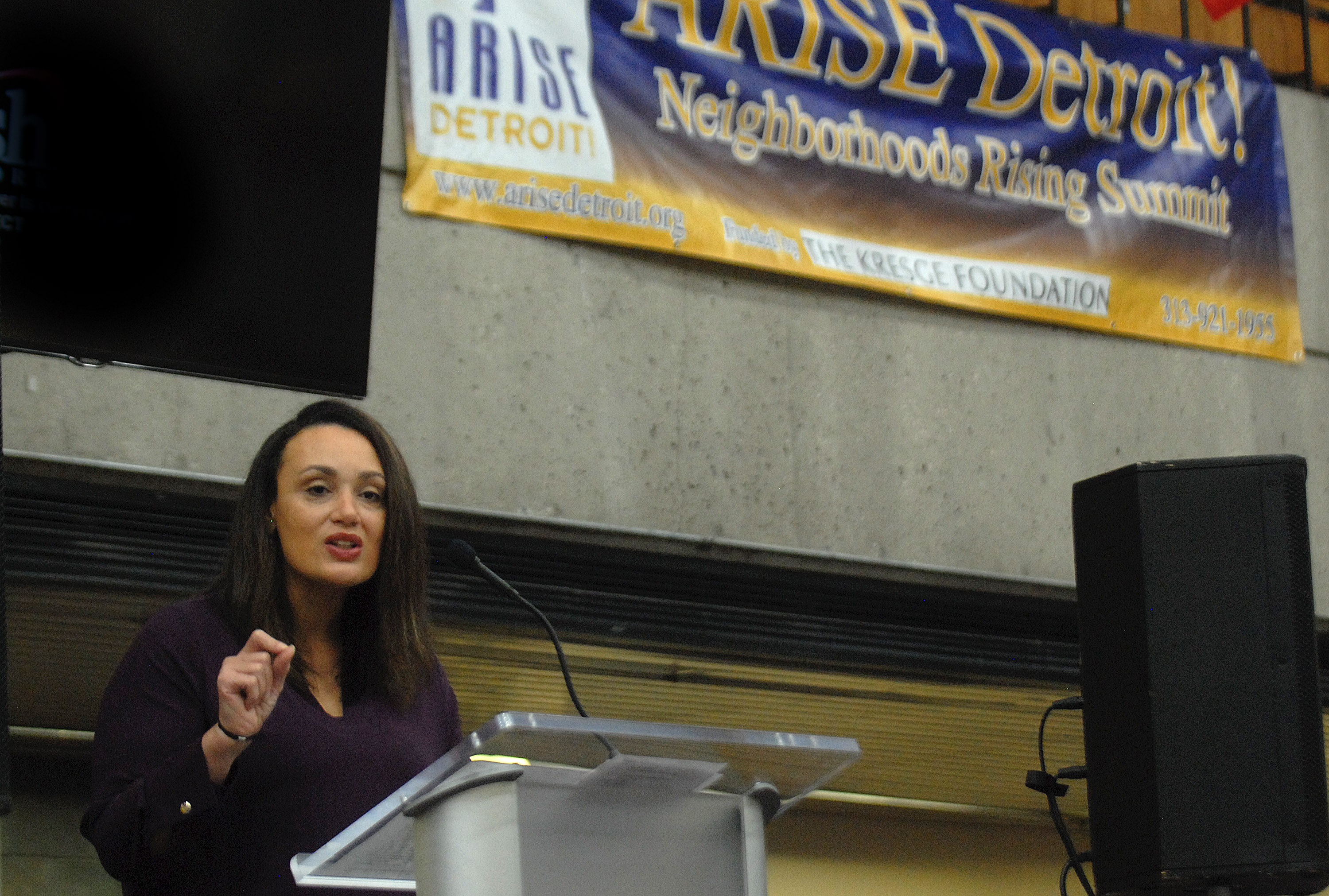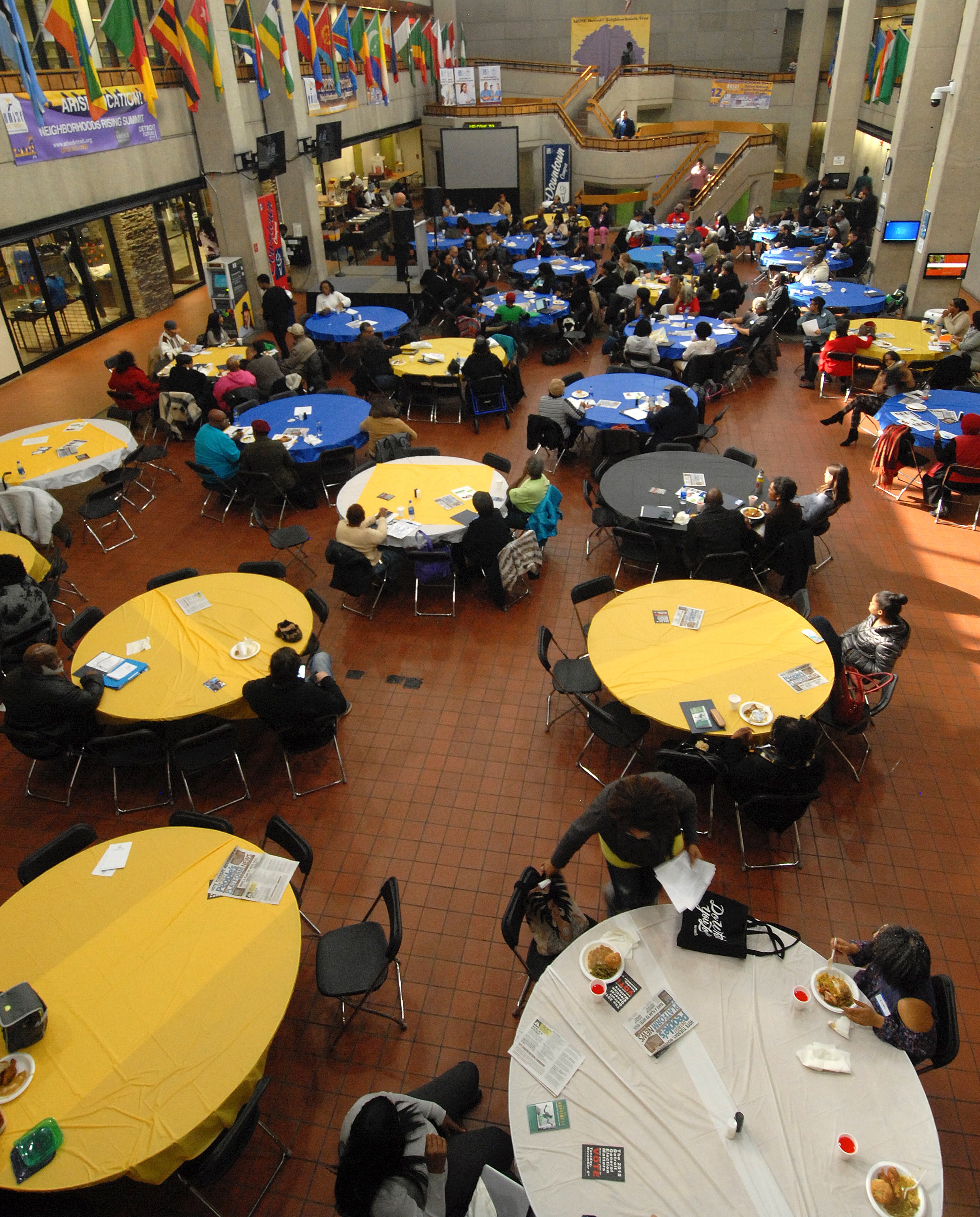
Detroit is on a development bubble that could lift it to new heights of growth and prosperity.
But that growth should not come to the detriment of city residents, according to participants and speakers at the ninth annual ARISE Detroit! Neighborhoods Rising Summit, recently held at the downtown campus of Wayne County Community College District.
Now is the time to ensure that growth is not harmful to neighborhoods or those living there could suffer as an influx of resources and new residents push them aside, summit speakers said.
“It is already happening,” said developer Rainy Hamilton, an architect, owner of Anderson Hamilton Associates, addressing more than 300 people who attended the summit.. “We are in a state of emergency. It is already almost too late.”
Hamilton, whose company has been involved in many Detroit development projects, and other speakers at the event, said the influx of resources and people, often called gentrification, is not a bad thing if the people who have lived in the city for decades keeping it afloat, are not frozen out.
They worry that speedy and transformational developments that took root in East Palo Alto, Brooklyn, Harlem and other cities across the nation, seemingly overnight, will happen in Detroit.
In Brooklyn, for example, numerous bars, eateries and housing catering to more affluent crowds opened and transformed the borough. The developments led to many longtime residents being pushed out due to higher rents, homes razed for businesses or for parking lots.
“Who wouldn’t want a better-looking city?” asked developer David Alade, co-founder and managing partner of Century Partners who spoke at a lunchtime panel at the summit. “Who wouldn’t want better safety? The bad thing is when it comes to displacement.”
Alade, whose company focuses on neighborhood-focused real estate projects, is referring to new developments that push people out of their neighborhoods because new rent prices or home prices are too high. He said residents in Detroit have to get involved in the process to avoid being frozen out.
Attendees urged residents to attend city zoning board meetings, planning meetings, City Council meetings and any other public hearings to make sure their concerns are entered into the public record.
Recognizing the investment influx, the Detroit City Council recently enacted an ordinance stipulating that 20 percent of all public housing subsidies of $500,000 or greater be set aside for units for lower income residents.

Rainy Hamilton recently renovated a housing unit in the city that increased rent just $30 a month although the housing was significantly upgraded. And the Little Caesars Arena has a board made up of community members to make sure that promised neighborhood improvements are implemented.
“We have a voice,” DeShawn Hurt of the Regent Park Community Association, on the city’s east side. “We can stand up and tell them what we need.”
Luther Keith, executive director of ARISE Detroit, said gentrification has taken on such an ugly connotation that he favors using a new term he coined – ARISE-ification.
The new term refers to resources that come into the city and residents that move in and work with existing residents to ensure no one is frozen out and the character of areas in Detroit do not change.
“You can’t have developments where people lose their homes and lose their jobs,” Keith said. “We are not just against gentrification. We are for ARISE-ification.”
Longtime Detroiter Shirley Corder agreed.
“I love it,” the resident of Rosedale Park said of the new term. “It feels more positive. I am all for inclusion. We have made great progress (downtown and in Midtown). Now we want to see it move out into the neighborhoods.”
Morning keynote speaker Tonya Allen, president and CEO of the Skillman Foundation, is a longtime supporter of ARISE Detroit! She said over the next decade, the city could see major changes. But if residents are not careful, they will not be part of that wave and need to make sure investors and new residents respect the people who have kept the city going by ensuring changes do not have a negative impact.
“This is our city,” she said. “If you (investment or new residents) come into Detroit, we want you to respect our city.”
Wendy Jackson, managing director of the Kresge Foundation, a funder of ARISE Detroit, said making neighborhoods part of any major improvements in the city is paramount.
“This is our highest priority,” she said. “We truly believe there won’t be a comeback in this city without the neighborhoods.”
The summit featured 12 workshops that focused on everything from how to get a community group organized to public safety concerns to water shutoffs to entrepreneurship opportunities.
Toni Mcilwain, a member of the ARISE Detroit! Board and former president of the Ravendale Community Inc. group on the city’s east side, said one way to keep a handle on gentrification is to help landlords find suitable tenants. They will be less likely to sell their properties to developers if they know they have tenants that are not tearing them up and paying rent on time.
“Let’s work together,” she said. “You get rid of bad tenants and we will help you find good ones.”
No matter what, keeping gentrification in check and promoting ARISE-ification will require hard work, Tonya Allen of the Skillman Foundation said.
“This is not work for the faint of heart,” she said clutching a hand to her chest. “This is hard work. This is heart work.”
ARISE Detroit! is a nonprofit coalition of more than 400 organizations, promoting volunteerism, community activism and positive media images to create a better Detroit. Learn more at www.arisedetroit.org, or phone, 313-921-1955.